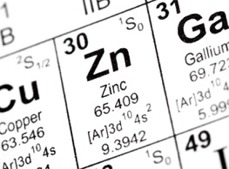Zinc (Zn)

Zinc is an essential nutritional metal element of massive importance to all living organisms. Half the soils in the world are Zn-deficient and the WHO estimates that 800,000 people die annually as a result, 450,000 of them children.
Plants require zinc for all enzyme activity, for growth and immunity from disease, for protein production and even for DNA; in all for thousands of processes. Like all micronutrients, zinc does not operate in a vacuum; it is a co-factor with many other elements and particularly with copper. If the two are not in balance, they act as antagonists to one another.
In livestock, zinc is vital for enzyme production, growth, immune response and fertility. Skin diseases, poor appetite, foot problems and stunted growth are very often the result of Zn deficiency.
In humans, where zinc is deficient, we find general debility, dwarfism, defective immune systems, hyperthyroidism and arrested sexual development. In healthy populations, concentrations of zinc are found in the eyes, prostate, liver, kidneys and muscles. Dietary zinc is as important to us as to animals and plants.
The distribution of Zinc in UK and European soils is patchy and should be more closely monitored than is the case.
Zinc Deficiency Symptoms in Plants
Lodging due to poor cell-wall strength
Stunted plants
Pale green interveinal areas of leaves
Small leaves
Rosetting
‘White buds’
Zinc Deficiency Symptoms in Livestock
Loss of appetite and thrift
Retarded growth
Slow healing
Poor reproductive performance
Poor hair / wool growth
Skin sores
Poor Feet
Joint stiffness
Depressed immune system
